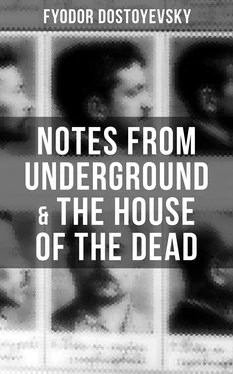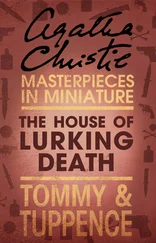I sat down beside them. On my right two convicts were conversing with an attempt at dignity.
‘I’m not likely to be robbed,’ said one of them. ‘I’m more afraid of stealing myself.’
‘It wouldn’t be a good idea to rob me. The devil! I’d pay the man out.’
‘But what would you do? You’re only a convict. We have no other name. You’ll see she’ll rob you, the wretch, without even saying “Thank you.” The money I gave her was wasted. Just fancy, she was here a few days ago! Where were we to go? Shall I ask permission to go into the house of Theodore, the executioner? He has still his house in the suburb, the one he bought from that Solomon, you know, that scurvy Jew who hanged himself not long ago.’
‘Yes, I know him, the one who sold liquor here three years ago, and who was called Grichka-the secret drinking-shop.’
‘I know.’
‘All brag. You don’t know. In the first place it’s another drinking-shop.’
‘What do you mean, another? You don’t know what you’re talking about. I’ll bring you as many witnesses as you like.’
‘Oh, you will, will you? Who are you? Do you know to whom you are speaking?’
‘Yes, indeed.’
‘I’ve thrashed you often enough, though I don’t boast of it. Don’t give yourself airs then.’
‘You’ve thrashed me? The man who’ll thrash me has yet to be born; and the man who did is six feet below ground.’
‘Plague-stricken rascal of Bender!’
‘May the Siberian leprosy devour you with ulcers!’
‘May a chopper cleave your dog of a head.’
Insults were falling like rain.
‘Come, now, they’re going to fight. When men can’t behave properly they should keep quiet. They’re only too glad to come and eat Government bread, the rascals!’
They were soon separated. They fight with their tongues as much as they wish; that is allowed. It is a diversion at everyone’s disposal. But no blows. It was, indeed, only in extraordinary cases that blows were exchanged. If there was a fight, it was reported to the governor, who ordered an inquiry or directed one himself; and then woe to the culprits! Accordingly the prisoners set their faces against anything like a serious quarrel; besides, they insulted one another chiefly to pass the time, as an oratorical exercise. They get excited; the quarrel takes on a furious, ferocious character; they seem about to slaughter one another. But nothing of the kind happens: as soon as their anger has reached a certain pitch they separate.
That astonished me much, and if I relate certain conversations between the convicts I do so with a purpose. Could I have imagined that people could have insulted one another for pleasure, that they could find enjoyment in it?
We must not forget the gratification of vanity. A dialectician who knows how to insult artistically is respected. A little more, and he would be applauded like an actor.
Already on the previous night I had noticed some glances in my direction, and several convicts had even hung around me as if they had suspected that I had brought money with me. They endeavoured to get into my good graces by teaching me how to carry my irons without inconvenience, and gave me-of course in return for money-a box with a lock, in which to keep the equipment entrusted to me by the authorities, and the few shirts that I had been allowed to bring with me. Yet the very next morning those same prisoners stole my box, and drank the money which they had taken out of it.
One of them afterwards became a great friend of mine, though he robbed me whenever opportunity offered. He was, all the same, vexed at what he had done. He committed these thefts almost unconsciously, as if in the way of a duty. Consequently I bore him no grudge.
These convicts let me know that one could have tea, and that I should do well to get myself a teapot. They found me one, which I hired for a certain time. They also recommended me a cook, who, for thirty kopecks a month, would arrange the dishes I might desire, if it was my intention to buy provisions and take my meals apart. Of course they borrowed money from me. The day of my arrival I was asked for a loan on three separate occasions.
We noblemen who had been degraded and incarcerated here were frowned upon by our fellow prisoners; although we had lost all our rights like the other convicts, we were not regarded as comrades.
In this instinctive repugnance there was an element of reason. To them we were always gentlemen, although they often jeered at our fall.
‘Ah! it’s all over now. Mossieu’s carriage formerly crushed the passersby at Moscow. Now Mossieu picks hemp!’
They knew our sufferings, though we hid them as much as possible. It was principally when we were all working together that we had most to endure, for our strength was not so great as theirs, and we were really not of much assistance to them. Nothing is more difficult than to gain the confidence of the common people, especially such people as these!
There were only a few of us in the whole prison who were of noble birth. First, there were five Poles, of whom I shall later speak in detail. They were detested by the convicts more, perhaps, than the Russian nobles. The Poles-I speak only of the political convicts-always behaved to them with a constrained and offensive politeness, scarcely ever speaking to them, and making no endeavour to conceal the disgust which they experienced in such company. The convicts understood all this, and paid them back in their own coin.
Two years passed before I could gain the goodwill of my companions; but the greater part of them liked me, and declared that I was a good fellow.
There were altogether-counting myself-five Russian nobles in the convict prison. I had heard of one of them even before my arrival as a vile and base creature, horribly corrupt, doing the work of spy and informer. Accordingly, from the very first day I refused to enter into relations with this man. The second was the parricide to whom I have already referred. The third was Akimitch. I have seldom met such an extraordinary man, and I have still a lively recollection of him.
Tall, thin, weak-minded, and terribly ignorant, he was as argumentative and as meticulous as a German. The convicts laughed at him; but they feared him on account of his susceptible, excitable, and quarrelsome disposition. As soon as he arrived he was on a footing of perfect equality with them. He insulted them and beat them. Phenomenally just, it was sufficient for him that there was injustice to interfere in a matter which did not concern him. He was, moreover, extremely simple. When he quarrelled with the convicts he reproached them with being thieves, and exhorted them in all sincerity to steal no more. He had served as a sublieutenant in the Caucasus. I made friends with him the first day, and he related to me his ‘affair.’ He had begun as a cadet in a Line regiment. After waiting some time for his commission as sublieutenant, he at last received it, and was sent into the mountains to command a small fort. Some tributary princeling in the neighbourhood set fire to the fort, and made an unsuccessful attack.
Akimitch was very cunning, and pretended not to know who was the author of the attack, which he attributed to some insurgents wandering about the mountains. A month later, he extended a friendly invitation to the prince to call and see him. The prince, suspecting nothing, arrived on horseback. Akimitch drew up the garrison in fine of battle, and harangued his troops upon the treason and villainy of his visitor. He reproached him with his conduct; proved to him that to set fire to the fort was a shameful crime; explained to him minutely the duties of a tributary prince; and then, by way of peroration to his harangue, had him shot. He at once informed his superior officers of this execution, with all the details necessary. Thereupon Akimitch was brought to trial. He appeared before a court martial, and was condemned to death; but his sentence was commuted, and he was sent to Siberia as a convict of the second class-condemned, that is to say, to twelve years’ hard labour and imprisonment in a fortress. He readily admitted that he had acted illegally, and that the prince ought to have been tried in a civil court and not by a court martial. Nevertheless, he could not understand that his action was a crime.
Читать дальше












